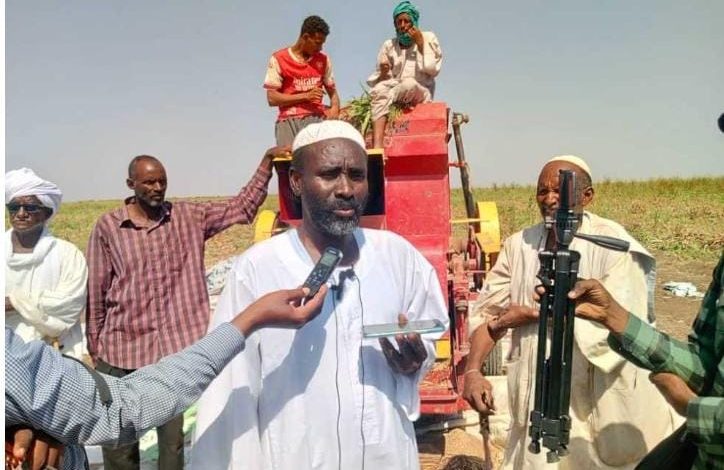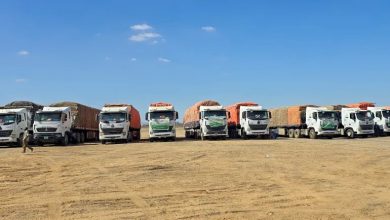Suki Agricultural Scheme, Recovered

Report – Rehab Abdullah
After a suspension that lasted for three years, and the fleeing of most farmers and herders to neighboring states and regions in search of livelihood and pasture for their livestock, the farmers, in the presence of a number of state officials and members of the initiative to rehabilitate the Suki Agricultural Scheme, celebrated yesterday (Wednesday) the harvest of the sorghum crop in Wad Wanasa Al-Kananab village, canal 29, with a productivity exceeding (100) sacks per Hawasha (farm). During the ceremony, the farmers expected the productivity of an fedan sorghum to increase from (15 to 20 sacks) or even to 30 sacks, by irrigating an area of 65 thousand fedans out of a total of 130 thousand fedans. The farmers stressed the necessity of completely solving the problem of irrigation and financing at the specified times, in addition to designing irrigation channels and providing the necessary technologies.
Original story
The head of Suki rehabilitation initiative, Engineer Omer, who now occupies a high status among the farmers who were subjected to great prejudice and injustice in the recent years, recounts details about the scheme’s recovery and its resumption of production again. Omer, whose eyes filled with extreme happiness against the backdrop of the farmers’ joy at the start of their harvest, said: The Suki Agricultural Scheme returns to the production circle with a production of 100 bags per farm. The scheme has previously contributed to very high productions in previous periods. Hashem attributed that the scheme was recently exposed to collapse due to many problems, including the disruption of irrigation pumps and the failure of the finances to meet maintenance bills for a period of five years, as well as due to the large amount of financial and administrative corruption, as the last funding for fertilizer was in the year 2021. The scheme management increased the urea fertilizer bill to the amount of 270 billion, which is three times the price of the fertilizer. According to the documents and the report of the Auditor General, he pointed out that the Federal Minister of Agriculture and the group of farmers from the Suki Agricultural Scheme Rehabilitation Initiative were able to restore life to this land, which has an area of no less than 130,000 fedans out of the total area of the Suki Agricultural Scheme, and 12,500 farmers, and 136 villages benefit directly from the scheme and 700 thousand people, in addition to more than double this number, were displaced from Khartoum and live with their relatives in these villages and this scheme. He continued, “If it were not for the efforts of the Federal Minister of Agriculture, with the assistance of the Federal Minister of Finance, the Pumps Department of the Ministry of Irrigation and the Agricultural Bank, as well as the solidity, awareness, and participation of the security services within “The localities of the scheme and the awareness and sacrifice of the Farmers Group in the initiative to rehabilitate the Suki scheme when we were able to reach this production and this day,” adding that thanks to the joint efforts of this group, an area of not less than 65 thousand fedans was irrigated, including 4 thousand fedans of molokhiya and about three thousand okra and the same amount of sesame. And four thousand fedans of lentils, 500 fedans of vegetables, and 60 thousand fedans of sorghum , after a cessation of production that lasted for about three years, pointing out that the previous year, four million heads of livestock migrated from the scheme due to the lack of drinking water for the animals.
Hashem noted that the expected productivity rate of sorghum this year ranges from 15 to 20 sacks per fedan, for an area within 20% of the 60,000 fedans that have been irrigated, and he expects productivity to rise if the technology is fully applied and irrigation is carried out at an appropriate rate, bringing the average fedan to 30. It is expected that the productivity of one fedan now will not exceed 8 to 10 sacks for 80% of the total area of 60,000 fedans irrigated with sorghum . He described this productivity as below ambition and very low. He attributed this to the fact that most farmers use traditional tools in agriculture and do not follow… Minimum recommended technology.
Pointing out that the Agricultural Bank has stopped financing the Suki scheme since the year 2010, in light of the fact that it had arrears amounting to 14 billion pounds to the Agricultural Bank since the year 2010, and in this current year, 2023, after the intervention of the Minister of Finance and Economic Planning, the Agricultural Bank agreed to finance the scheme and grant the scheme13,730 bags of fertilizer for the summer season. The Agricultural Bank announced its readiness to address the irrigation problem once the debts are paid.
Omar Hashem pointed out that there is a complete absence of some government institutions, especially irrigation, as 57 canals face problems of fractures and water waste. The problems have now been addressed, and the irrigation employees were working on irrigating the scheme for only 8 hours.
The representative of the Ministry of Agriculture and Forestry and the Undersecretary of the Ministry, Dr. Salah Sharif Tombl, revealed that the state has benefited from agriculture and provided it with 30 billion pounds in one month, calling at the same time for the importance of farmers agreeing to increase production, and expressing his wish that the Harvest Festival next year will witness the supply of warehouses to the scheme. Refrigerated storage and increased training opportunities for employees on how to deal with modern technology in the field of agriculture.
Supporting the state treasury
Evidence is that the scheme has been known to have supported the national economy since the 1970s, as the Undersecretary of the Ministry of Agriculture and Forestry, Dr. Salah Sharif Tombl, acknowledged that agriculture was able to provide the state with 30 billion pounds in one month.
Stressing that agriculture has become the state’s only resource, he called for the importance of farmers agreeing to increase production for the Suki Agricultural Scheme to recover from the high productivity of the Kananab Scheme, stressing that there are challenges facing the scheme, represented by the importance of reforming the infrastructure to attract investors in the agricultural sector, such as electricity and roads. And transportation and cold storages to preserve products, explaining this by saying: Electricity represents 70% of the elements of attracting investments. He pointed to the importance of using modern technology, pointing out that there is a law enacted by his ministry related to the necessity of using modern technology in agriculture and the necessity of using modern technology in the field of cultivation of improved seeds to increase productivity fedans.
He expressed his hope that the Harvest Festival next year will witness supplying the scheme with cold storage and increasing opportunities for training employees on how to deal with modern technology in the field of agriculture.
High productivity
The National Coordinator for Integrated Solutions in Kananab at the Federal Ministry of Agriculture, Al-Hadi Siddiq, said that the farms in the region were able to achieve a record productivity of 20 sacks per fedan.
He confirmed the complete return of life to the Suki agricultural scheme and its entry into the production circle after three lean years
He expressed his desire for a fedan to achieve 50 sacks in the coming agricultural seasons, which indicates that if the farmer has the potential and uses technology, effective management, and aids, he can improve his life for the better.
But farmers have demands
The farmers called on the state to intervene urgently in controlling prices and lowering the purchasing price
The farmer of the Suki agricultural scheme, Adam Mohammed Yahya Khair, rejoiced in the initiative to rehabilitate the scheme if it succeeds in lifting the farmer out of despair, and Yahya expected that the production per fedan would reach between 17-18 sacks. Adam explained that a fedan of cotton production reached 79 sacks during the era of former President Jaafar Numeiri, which had a positive impact on him. The agricultural process deteriorated due to the lack of irrigation.
Farmer Hussein Mohammed Nasser expressed his hope that the company’s investors would enter agriculture to increase the cultivated areas and reduce the productivity per fedan from reaching 21 quintals. He confirmed his intention to grow cotton according to special capabilities and called on the Ministry of Irrigation to expedite maintenance, so that they can enter the new season in a better way than now and grow a cash crop whose return shall in dollars like cotton, and he stressed the importance of preparing the fields for cultivation and expected a productivity of 5 quintals. He appealed to the state to exert its efforts for vulnerable farmers, thus ensuring that the Sudanese economy is supported by agricultural income. He complained about the high price of fertilizer, noting that the price of a sack reached 40 thousand pounds. He called on the state to intervene to reduce prices.



